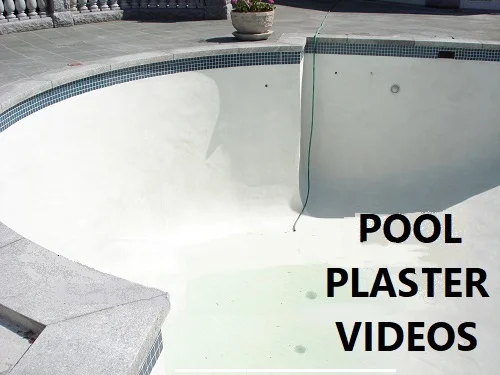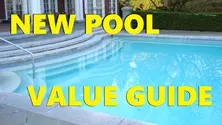Plaster Pools Videos
SwimmingPoolSteve.com is user-supported. In order to keep this resource about pools and spas available for free to all readers I earn commissions for purchases made through links on this page. For more information see the full disclaimer page. By using this website you are agreeing to the terms and conditions.

The videos highlighted here are just a few of the videos from the Swimming Pool Steve Youtube Channel. You can scroll through the pool videos or you can jump to the pages for:
Concrete Pool Videos
Plaster Pool Videos
Vinyl Liner Pool Videos
Measuring Pool Liners
Pool Pumps Introduction
Pool Pump Troubleshooting
Variable Speed Pool Pumps
Pool Filter Videos
Salt Water Pool Videos
Plaster Swimming Pools
Can I Plaster My Own Pool?
Plastering a swimming pool is something that takes practice and experience to do. Simply understanding the process of how to plaster a swimming pool and knowing which materials to use to make and apply the plaster are not enough. Without years of experience and masterful skill with a trowel there is almost no way that you can plaster your own pool to a satisfactory degree. Plastering requires technique as well as a working familiarity with the timing of curing plaster, when to trowel and when to wait for the plaster to set up more before proceeding.
I would very strongly encourage anyone thinking to plaster their own pool to look towards alternative options or hiring an experienced professional pool plaster crew to complete this work for you. It is worth mentioning that alternatives to pool plaster including paint, roll-on plaster products as well as fiberglass overlay products all have the same shortcoming in that they are not plaster. This means that one day in the future when this surface fails, which many plaster alternatives do, you will now need to take an additional (expensive) step of having the interior surface of the pool sandblasted clean down to bare concrete shell substrate before proceeding with another interior surface in the pool. I understand the desire to plaster your own pool, but the skills required are prohibitive which makes people look at interior surfaces they can do...but these surfaces have higher failure rates than plaster, are also hard to apply, and then ultimately need to be removed with sandblasting one day.

Why Does My Pool Plaster Feel Rough?
Pool plaster is intended to be smooth as this smooth finish enhances the water resistance of the pool. Concrete pools without a specific waterproofing membrane or treatment of some kind will all readily leak water. Concrete is porous and plaster is just portland cement and sand (or similar aggregates) which is also a porous substance. It is the hard trowel process that provides some measure of water resistance to the pool, and this helps to slow the rate of water leeching into your substrate concrete.
When you feel your plaster becoming rough this is an indication that your plaster has reached the end of its service life. Rough pool plaster, aside from being uncomfortable to walk on, will also accept stains readily and promote bacterial growth and algae growth in your pool versus a smoother interior surface with less room for these to hide in and cling to. Pool plaster that is in perfect condition and pool plaster that is completely ruined look almost identical. The only main difference is that one is smooth and the other is rough. This is one of the reasons why it is actually a bad idea to acid wash concrete pools. Yes this will certainly make old, stained and dirty pool plaster look brilliant white again, at least for a short while, but acid washing etches concrete and burns away portland cement leaving behind only the aggregates which results in a weak, sandy and rough interior surface in your pool. Some service companies love to sell aid washing services, however as a pool owner you should strive to never acid wash your pool if you can avoid it. Acid washing prematurely makes your pool plaster rough which advances the "age" of the plaster to a serious degree. It is also worth noting that rough plaster can also be a sign of a serious chemical imbalance and not regular aging of the plaster surface. Take a look at this pool with advanced calcification of the plaster surface due to extreme neglect of the water chemistry: high pH causes extreme calcification of a concrete pool.
How Long Does Pool Plaster Last?
Pool plaster is supposed to be smooth and how you tell it is time to replaster your pool is by how rough the surface of your plaster is. When rough the plaster allows bacteria and algae places to hide and live within your pool, and both brushing and chlorine treatments will struggle to deal with bacteria and algae when you have a rough plaster surface. How long a plaster lasts depends on where you live with freezing climate areas having the shortest service life for plaster pools.
A pool plaster should last anywhere from 5 to 15 years and how well you balance your water chemistry is the most important factor that affects how long your plaster lasts. Acid washing is also something that concrete pool owners often do however this, while cleaning the surface of the plaster, does serve to advance the age of the pool plaster and should only be done as a last resort for plaster pools. Acid burns away the portland cement in the top layer of the pool plaster which is how it is so effective at removing stains. This process also leaves the plaster surface rougher than before, as well as sandy and weak. Despite how nice acid washed pools look if you want your plaster to have the longest service life possible then avoid acid washing your pool. A chlorine wash with a heavy brushing with a stiff nylon brush is almost as effective at cleaning aged and stained plaster without burning away the top layer of portland cement. Even better would be to not let your pool become stained or green from poor water chemistry management in the first place.
How To Fix Brown Stains On Pool Plaster
If the plaster is new, or has leaves sitting on the floor of the pool for an extended period of time the tannin oils from the leaves can leech into the plaster leaving a brown stain. This would be common for stains that are sporradic, or if you have one or two brown stains. It is also possible that there is rust bleeding through the plaster from rebar or tie wire which is too close to the surface of the pool finish.
Tannins can be removed with chlorine treatment or acid treatment (poured down a PVC pipe that it sitting right on the stained area) however this can cause the stained are to discolor, even if it removes the brown color this area of the pool finish may now look different. In the case of rebar rust staining you will require greater remediation in that you will need to chip out the plaster, expose the rusting metals, cut them out completely and then patch that plaster area. If you have brown staining on your pool which is widespread or also covers vertical surfaces in addition to horizontal surfaces then this could be iron staining. Iron can get in your water from poor or contaminated source water (well water commonly has high iron), fertilizer used on or near your property can be iron based, or you can have iron in your water from corroding or failing metal components within your pool system, like an old failing heater. Sometimes you can have iron in your pool from day one and it is "not a problem" but suddenly you have brown staining issues. Metals in pool water can be complicated as the metals can be visible, like brown stains on your plaster, or it can be dissolved in solution in the water and not visible at all...until you add some chlorine or another oxidizer and suddenly, like black magic (brown magic?) the water turns brown right in front of your eyes. This article about brown pool water talks about your options to remove iron from your pool versus leaving it in the water by chelating it which binds with the iron. This prevents it from oxidizing or leaving stains in your pool even though technically the iron is still present in the water. For suspected iron staining on your pool plaster try rubbing ascorbic acid (vitamin C) into the stain, and iron stains will magically disappear before your eyes. You can also buy a pool stain test kit
How To Get Rid Of Green Stains On Pool Plaster?
Green staining on your pool plaster will either be from organic plant matter growth in the form of algae or it can also be from copper that is in your pool water that has become oxidized. Algae starts to grow immediately in your pool any time you let your chlorine level drop to zero. If the pool plaster surface is impeccably smooth then algae and bacteria have a hard time finding somewhere to hide from the chlorine. With a rough pool plaster bacteria and organic debris readily attach to the plaster walls and floor and regular brushing and chlorinated water might not be enough to deal with this.
If your plaster is rough to the touch then this probably means the plaster is at or near the end of its service life. Rough texture is how to measure if your plaster has failed. It should be completely smooth (smoother than 2000 grit sandpaper). Many pool owners have plaster that is closer to 200 grit sandpaper and this represents a plaster that definitely needs to be refinished. Acid washing will remove green stains but makes the plaster surface even rougher than before. Regular brushing of the wall and floor may be enough along with maintaining proper water chemistry, but a rinsing and brushing the pool with a chlorine wash instead of an acid wash will harm the pool plaster much less and also provide some improvement for green staining from algae. Green staining from oxidized coper means that you have high levels of copper in your water, either from contaminated source water, copper based algicides, copper ion devices, or a failing pool heater. To learn more about green water and also copper treatments you can read this detailed article about potential causes for green pool water.
Concrete Pool Videos
Plaster Pool Videos
Vinyl Liner Pool Videos
Measuring Pool Liners
Pool Pumps Introduction
Pool Pump Troubleshooting
Variable Speed Pool Pumps
Pool Filter Videos
Salt Water Pool Videos
Top content from www.SwimmingPoolSteve.com
Pool and spa chemistry crash course
New pool owner guide
The Swimming Pool Steve blog
Have a question - ask Steve

Swimming Pool Steve is an award winning, second generation swimming pool specialist from Ontario Canada and one of the most trusted voices in the swimming pool industry. With over 20,000,000 views on the Swimming Pool Steve YouTube Channel, winner of the Pleatco Pool & Spa Industry Leadership award and author of hundreds of pool and spa articles both online and in print. Steve is committed to helping pool and spa owners as well as pool and spa industry workers learn more about the technical side of building, renovating, repairing and maintaining all types of swimming pools and spas. Follow Swimming Pool Steve on Facebook, Twitter and YouTube.
Paid PDF Books From Swimming Pool Steve
 Steve's Pool Survival Guide
Steve's Pool Survival Guide
The Swimming Pool Steve Pool Survival Guide is intended to help pool owners understand their pool and pool equipment better, understand water chemistry, water testing and chemical corrections to the water, troubleshoot the most common pool problems and have confidence in interacting and caring for their pool in the fastest possible frame of time. Also covers pool safety, things to avoid and how to operate your pool more efficiently.
 New Pool Heater Buyer's Guide
New Pool Heater Buyer's Guide
In this guide Swimming Pool Steve will help you to better understand your heater options as well as which would be best suited for your pool. Learn about BTU output and sizing of both gas/propane heaters as well as electric heat pumps for residential swimming pools. You will also learn about which specific brands and models of currently available pool heaters Steve likes to recommend. If you are thinking of adding a new pool heater to your equipment pad this buyer's guide would be a useful resource to help you make a more informed buying decision.
 New Pool Installation Value Guide
New Pool Installation Value Guide
This is a value shopping guide written by Swimming Pool Steve to help home owners hiring for a new pool installation to get the maximum value for their investment with tips about how to protect your interests during the vetting, hiring and pool installation process. Anyone serious about having a pool installed will find value in this guide. Pool installers will sell the pool package that is best for them - not for you! Become an informed value shopper with this PDF guide.
Endorsed Brands From Swimming Pool Steve
The following links and products are to affiliates of the Swimming Pool Steve website. These are brands, products and services hand selected by Steve for endorsement. Please note that these endorsements can include monetary compensation, affiliate links and referral fees to Swimming Pool Steve, however there is zero additional cost to you should you use one of these products or services. Income generated from these links helps to keep this pool and spa resource available for everyone. To have your product or service considered for listing here as an endorsed brand email SwimmingPoolSteve@gmail.com.
Amazon Disclosure Statement - As an Amazon Associate I earn from qualifying purchases.

www.PoolPartsToGo.com
New Black + Decker variable speed pumps are available online from www.PoolPartsToGo.com and they are a drop in replacement for many popular pump models including Pentair Superflo and Hayward Super Pumps. With an adjustable platform base, union connections included and a very strong warranty these pumps offer an impressive value to pool owners.
- Swimming Pool Steve




